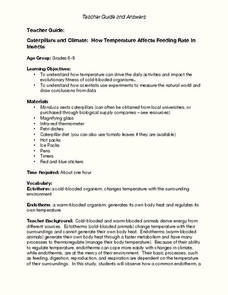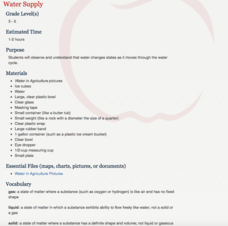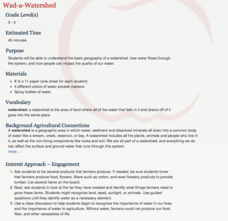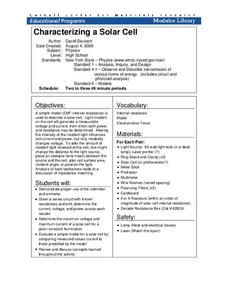Curated OER
Caterpillars and Climate: How Temperature Affects Feeding Rate In Insects
Do you eat more when you are hot or when you are cold? Young scientists observe the eating pace of two caterpillars at different temperatures. The differences in endotherm and ecotherm animals' ability to adjust to temperature change...
University of Hawaiʻi
Taxonomy and Me!
Taxonomy is the study of organisms and how you phylum. Three biology activities are included, helping scholars understand four of the six kingdoms, specifically Protista, Plantae, Fungi, and Animalia. Scholars observe and classify in...
Agriculture in the Classroom
A Rafter of Turkeys
How did that turkey get from the early Aztec culture to your table? Learn about the history of wild and domesticated turkeys in North America, as well as their inclusion in Thanksgiving traditions, with a two-part agricultural science...
University of Washington
The Carbon Cycle
When it comes to the carbon cycle, the sky really is the limit. The lesson begins with observing a closed ecosystem in a bottle. Then, scholars discuss and answer questions on the carbon dioxide and oxygen cycles.
Polar Trec
Arctic Smorgasbord!
Two blooms of phytoplankton, instead of just one, now occur in the Arctic due to declining sea ice, which will have widespread effects on the marine life and climate. In small groups, participants build an Arctic food web with given...
National Institute of Food and Agriculture
Water Supply
Participate in three activities that look at the earth's limited water supply and the changes water goes through as it enters each phase of the water cycle. The resource is complete with three activities that demonstrate the changing...
Agriculture in the Classroom
Wad-a-Watershed
What kind of impact do humans have on watersheds? Find out in a lesson that defines, explores, and promotes ways to protect our watersheds. The ultimate goal of the lesson is for learners to discover how a watershed is impacted by...
Pennsylvania State University
Learn, Protect, and Promote Water
A hands-on activity helps learners explore the water cycle. After discussing how they use water, classes discuss water pollution and then move into a simulation where 20 pupils move through the water cycle based on description cards.
Polar Trec
Why Can’t I Eat This Fish?
Can turning on the television lead to toxins in the food supply? The lesson offers an opportunity for young scientists to complete guided research. A worksheet lists each question as well as the web page necessary to answer the question....
Cornell University
Diffraction Demystified
Study diffraction patterns using CDs and DVDs! Scholars measure the diffraction patterns of a light wave as it hits a CD or DVD. Using the information, they can measure the distance between the tracks.
Beyond Benign
Green"er" Precipitation Reaction
All sodium carbonate may not have the same amount of carbonate, but it should have the same percent. Learners write and balance an equation to predict the chemical reaction between sodium carbonate and zinc acetate. Through the lab...
Cornell University
Characterizing a Solar Cell
Young classes are sure to get a charge out of this instructional activity! Learners experiment with circuits of a solar cell. They practice determining current, voltage, and power for the circuit and maximize the voltage and current of...
Cornell University
Optical Simulation of a Transmission Electron Microscope
Don't have an electron microscope? Have your classes build the next best thing! A hands-on lesson asks scholars to build a model of Transmission Electron Microscope (TEM). They then use their models to identify the function of each...
Agriculture in the Classroom
Roll of the Genes
Animal reproduction in sheep and cattle is explored with the help of Punnet squares. Scholars employ tools using probability to conclude the color of wool a sheep's offspring will have. Acting as animal geneticists, pupils then take...
NASA
Christa's Lost Lesson: Effervescence
How are chemical reactions affected by gravity? Learners explore the phenomenon of effervescence as part of the Christa's Lost Lessons series. They compare findings in an experiment on effervescence to a video of a similar experiment in...
Agriculture in the Classroom
Design 'Y'er Genes
How do changes in DNA affect an organism? Scholars explore chromosomes, genes, DNA, and mutations by modeling the DNA of a strawberry. They build a DNA model, then manipulate it to show how changing the genes transforms the strawberry...
Curated OER
It's Greek To Me!
In this language lesson, scholars use Greek root meanings to determine the meaning of words. After being shown how Greek roots are used in many words, such as, photosynthesis, pairs are given two excellent black line masters embedded in...
Curated OER
Layers of the Earth
In this Earth worksheet, students find 8 words, related to the Earth, in a puzzle. Students also use the words to answer 8 questions about the layers of the Earth.
Curated OER
Air Engine - Air Races
Students conduct an experiment about air volume, density, and pressure. In this air lesson, students discuss air, and how it moves. They make predictions about what will happen during the balloon and string experiment. They document the...
Curated OER
Urban Life: What Lives in Our Schoolyard?
Students research living organisms by exploring their school grounds. In this microscopic observation activity, students gather materials, insects, and objects from their playground and schoolyard and bring them into class. Students...
Curated OER
Plants 'n' Bugs
Second graders experiment to find if pollinators have color preferences. In this plant and bug lesson, 2nd graders gather information about how flowers pollinate. Students participate in a pollination experiment using the scientific...
Curated OER
Water Cycle
Second graders investigate the water cycle. In this water cycle lesson, 2nd graders discover how the water cycle effects erosion and weathering. Students create their own terrariums to view the water cycle. Students illustrate their...
Curated OER
Chemical Interactions
Students perform scientific investigations to observe chemical reactions. In this chemical reaction lesson students read a passage and identify the cause and effect.
Curated OER
Urban Life: What Lives In Our Local Park?
Fifth graders participate in activities during a visit to Central Park. In this urban life lesson, 5th graders visit Central Park where they explore pond dipping, stream chemistry, and play a native plant Bingo game.
Other popular searches
- Space Science Vocabulary
- Earth Science Vocabulary
- Food Science Vocabulary
- Science Vocabulary Games
- Vocabulary Forensic Science
- Physical Science Vocabulary
- Life Science Vocabulary
- Science Vocabulary Portfolio
- Vocabulary Exercises Science
- Science Vocabulary Puzzle
- Science Vocabulary Lesson
- Science Vocabulary Polymers

























